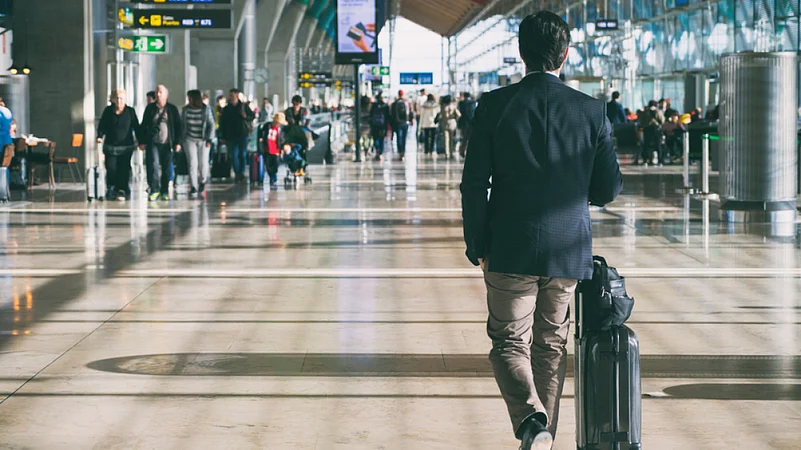“It feels like a terrible mistake,” I told myself as I squeezed in the aisle seat of the packed flight to Pune. I noticed my co-travellers whose masks were slipping from their noses. This made me angry, and I realised that I had been an angry, reluctant traveller the moment I stepped out of my parents’ home in Gurugram to travel to Pune, where I was headed to, for a business meeting. I was angry at the cab driver for carelessly spreading the towels on the seats – it looked messy, and I didn’t trust the car was sanitised properly. I was angry at the guard who manned the airport entrance and didn’t ask for a vaccination certificate or RT-PCR test from any of us who lined up to enter the airport. I was angry at the crowd I saw at the airport, ignoring the fact that I added to it. Given the careless nature of the checks outside, I wondered if any of us could be a lethal Omicron carrier waiting to infect the rest.
Now, inside the plane waiting for it to take off, I was irritated with the file of people streaming in and how packed the whole flight was. Keen on taking a business meeting in person, I had decided to head to Pune. I should have never ventured out, I chastised myself repeatedly. I closed my eyes and forced myself to take long breaths. It was then that I realised the emotion I was experiencing and that came interlaced with anger – fear.
I have not felt so trapped, so alone, so isolated in all my travels in the last 20 years as I have done in the last two. Not even when I stood on the edge of a cliff in Norway five years back, tied to a rope, waiting to jump. There then, the fear was paralysing. Still, I stepped ahead and off the cliff. That bungee jump was transformative. For those 10 seconds, I watched the fear inside me so closely that it failed to scare me as much as I had thought it would. That short 10-second jump encapsulated the transformative power of a journey.

We need journeys and their transformative power more than ever now. Fear has been a constant throughout the pandemic years. Yes, we fear to step out. Not only that, but we are also fearful for our families’ health, of our languishing careers, of our lives slowly slipping by in uncountable Zoom calls. This sustained exposure to fear has not only made us angry but also mistrustful of others. We judge others, for their actions directly put our health at risk.
As the plane took off, I reminded myself of the month-long road trip I had taken across India when I had graduated 16 years back. I wanted to cover the four corners
of the country and travel to the heartland before starting the corporate grind. The little money I had necessitated that I take the cheapest public transport. I would stand in a third-class rail compartment, my shoulders rubbing against another’s. There was no fear then. Perhaps it was my youth, or pure foolishness, which helped me forget being fearful. I remember distinctly the transformation that trip caused, and I overcame my hesitations to travel alone or talk to strangers. I made friends with whom I stay in contact even today. That month- long journey made me a traveller and melted my shyness a little.
Will I take such a trip again in the post- pandemic years, I wonder? Perhaps not. I have become a different person – and definitely not the intrepid traveller I used to be. As this realisation dawned, I opened my eyes. The fear-laced anger had altered into sadness. Yes, I had kept my sanity intact in the COVID years. But, overcome with fear of venturing out, I have lost the independence, the confidence to travel. Forget about striking up a conversation with an unmasked stranger. This latent fear of the ‘other’ has become a constant now.
It’s easier to sit inside closed doors than to get up and go. But that’s not an option anymore, at least for me. Doing so would mean becoming a closed version of myself – an older Nitin, who had transformed with the travels to far-off places and by surviving – even thriving – in alien settings. It’s time for me to get back out there. Travel, at least for me, still holds the power to transform, to amaze, to inspire and make bonds. It’s an antidote to the fear that I was experiencing.
Realising this, I turned around to speak to the person sitting next to me. He couldn’t see my smile hidden beneath the mask, but I would strike up a warm conversation still. Perhaps, he needs me as much as I need him.





















